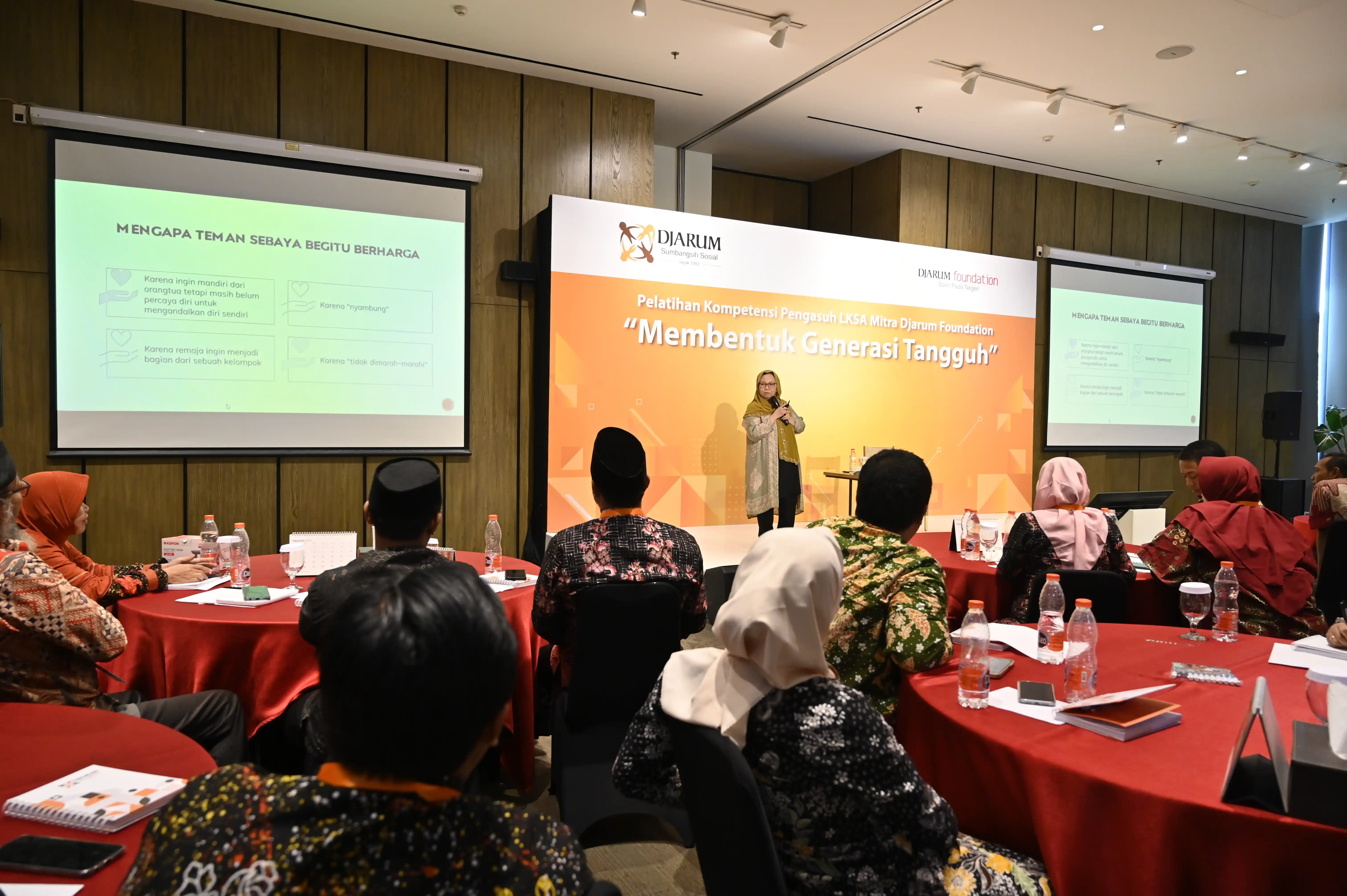Competency Training held by Djarum Foundation Partner LKSA Caregiver: “Membentuk Generasi Tangguh”
24 Agustus 2024
Bakti Sosial Djarum Foundation mengadakan Pelatihan Kompetensi Pengasuh LKSA Mitra Djarum Foundation, pada hari Sabtu, 24 Agustus 2024 di Wisma Ploso, Kudus. Pelatihan yang berlangsung selama satu hari ini, diikuti oleh 36 pengasuh LKSA yang telah menandatangani Memorandum of Understanding (MoU) untuk bekerja sama dengan Djarum Foundation dalam Program Bestari, yang bertujuan untuk membekali para Pengasuh LKSA agar semakin mumpuni dalam mendidik anak asuhnya di LKSA.
Satu bulan sebelum diadakan pelatihan, Djarum Foundation juga telah melakukan asesmen kepada Pengasuh dan Anak Asuh LKSA, untuk melihat pola asuh yang dilakukan selama ini, mencari kompetensi yang dibutuhkan, dan melihat permasalahan yang dihadapi dalam melakukan pendampingan, serta menyusun materi pelatihan agar lebih sesuai dengan kebutuhan para pengasuh.
"Hasil asesmen menunjukkan, bahwa para pengasuh harus mulai beradaptasi dalam melakukan pengasuhan dan pendampingan anak asuh, yang mayoritas merupakan generasi Z dan generasi Alpha. Saya yakin, proses adaptasi ini akan mampu dilakukan oleh para pengasuh secara bertahap, selangkah demi selangkah, namun terukur dan pasti", jelas Achmad Budiharto, Deputy Program Director Bakti Sosial Djarum Foundation. "Maka dari itu, kita perlu meningkatkan keterampilan tentang bagaimana mendampingi anak asuh, agar mereka nantinya mampu menjadi pribadi mandiri dan tangguh, serta siap menghadapi tantangan jaman yang semakin kompleks dan cepat berubah,"lanjutnya.
Pelatihan kompetensi kali ini difokuskan pada 3 prioritas utama keterampilan kepengasuhan; pertama mengenai pemahaman akan peran pengasuh, kedua mengenai keterampilan pengasuhan yang efektif (Effective Parenting), dan ketiga tentang bagaimana para pengasuh bisa berkomunikasi, berkoordinasi dan berkolaborasi, baik dengan sesama pengasuh maupun dengan anak asuh.
Narasumber pelatihan, Anggi V. Goenadi, Founder Inkubator Bisnis Permata Bunda dan Master Trainer BNSP RI, membawakan 2 sesi, sesi pertama berjudul Memahami dan Menguatkan Peran Pengasuh LKSA, dan sesi kedua bertajuk Komunikasi Interpersonal dan Pengasuhan Empatik. "Menjadi seorang Pengasuh LKSA adalah panggilan hati, niat saja tidak cukup, namun pengasuh harus meningkatkan kompetensi dan keterampilan diri untuk menuntaskan segala amanah dan tantangan-tantangan yang dihadapi. Setiap masa tantangannya akan beda, dengan punya bekal kompetensi dan keterampilan yang mumpuni mereka diharapkan akan melahirkan generasi yang tangguh di masa depan," ujar peraih Penghargaan Maarif Award Metro TV 2022 dan juga peraih Penghargaan Indonesian SDGs Award 2017 & 2018.
Hadir pula sebagai narasumber, Alissa Wahid, seorang Psikolog Keluarga, yang memberikan materi dengan judul Metode Pengasuhan Berbasis Psikologi Perkembangan. "Anak dan remaja tidak pernah menjadi sumber masalah, kalau anak terlibat masalah, maka sumbernya adalah dari orang dewasa yang bertanggung jawab disekitarnya. Sehingga kita bisa melihat, begitu besar peran pengasuh bagi perkembangan anak, apalagi perkembangan karakter dan kecakapan hidupnya, merekalah yang membentuk dan mempengaruhi bagaimana anak melihat dunia, serta mengelola hubungan-hubungan di sepanjang hidup anak asuh. Apalagi anak asuh LKSA ini membutuhkan sesuatu yang lebih, mengingat mereka memiliki kondisi khusus, sehingga penanganannya pun juga harus khusus," jelasnya.
Para pengasuh terkesan dengan pelatihan yang tidak hanya berupa penjelasan materi namun juga mempraktikan teknik pengasuhan dalam situasi sehari-hari, melalui role play, games dan diskusi kelompok. "Pelatihan ini memberi saya banyak wawasan dan keterampilan baru, yang dapat langsung dipraktikan dalam peran saya sebagai pengasuh. Sekarang Saya merasa lebih percaya diri dalam menjalankan tugas saya, karena telah dibekali keterampilan yang lebih baik untuk menghadapi segala macam tantangan," ujar Rian, pengasuh LKSA Tunas Muria, Kudus.
Begitu juga dengan Syafa’ah, pengasuh LKSA Darul Hadlonah di Rembang, yang merasa pelatihan komunikasi sangat berguna baginya. "Langkah pertama yang akan saya lakukan adalah menerapkan teknik komunikasi yang lebih efektif kepada anak-anak dan juga rekan kerja, lebih banyak mendengarkan anak-anak agar dapat memahami kebutuhan mereka. Saya ingin memastikan bahwa setiap anak mendapatkan perhatian yang mereka butuhkan untuk berkembang sesuai dengan potensi mereka masing-masing," jelasnya.
Lebih lanjut, Achmad Budiharto menjelaskan bahwa setelah pelatihan selesai, akan dilihat secara seksama hasil dari pelatihan ini, selama tiga bulan ke depan, apakah para pengasuh mampu menerapkan semua pengetahuan dan keterampilan yang didapatkan dalam pelatihan ini di dalam LKSA masing-masing. "Nantinya pelatihan kompetensi pengasuh tahap kedua akan diadakan kembali, dengan melihat perkembangan serta kebutuhan yang ada, serta saran dan masukan dari para pengasuh," terangnya. (*)

